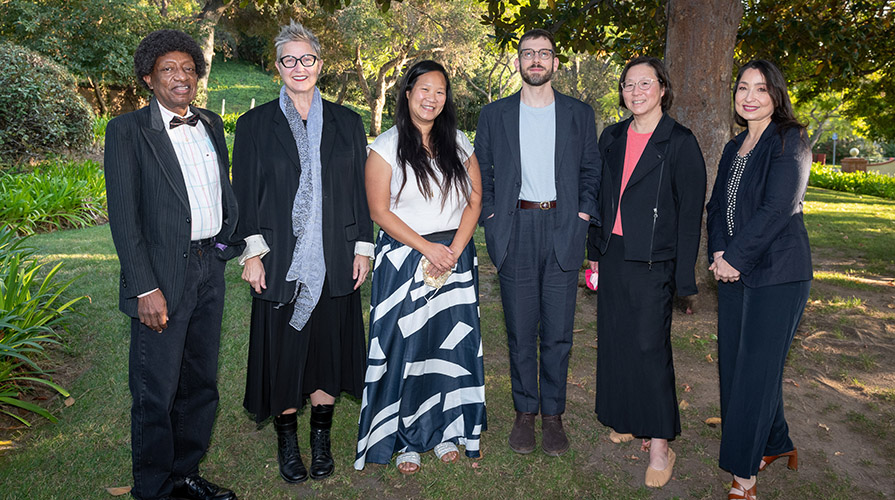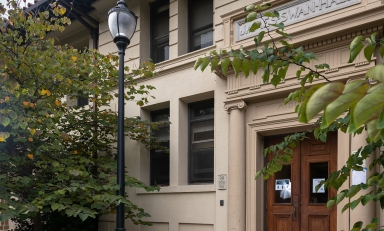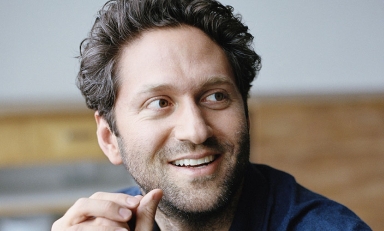
Six Occidental College professors were honored for exceptional teaching, scholarship and service at a November 2 campus reception hosted by Vice President for Academic Affairs and Dean of the College Wendy Sternberg.
Arthur Saint-Aubin, professor of French, and Mary Beth Heffernan, professor of art and art history were awarded the prestigious Graham L. Sterling Memorial Award, established in 1972 to recognize a faculty member with a distinguished record of teaching, service and professional achievement. (Two awards were made because of last year’s pandemic disruption.)
Mary Christianakis, professor of critical theory and social justice, was presented with the Janosik-Sterling Award for Service to the College, created in 1993 to honor the memory of politics professor Robert Janosik.
Ross Lerner, associate professor of English; Diana Ngo, associate professor of economics; and Anne Yu, senior instructor of chemistry, received the Linda and Tod White Teaching Prize. Based on student nominations, it has been presented since 2008 thanks to the generosity of Linda and Tod White ’59.
In nominating him for the Sterling award, Saint-Aubin’s colleagues cited his “superb record of professional achievement, the commitment of his teaching, and his investment to the Occidental community.” Breath, depth, and quality typify his scholarship. He has published five books and more than 20 articles dealing with such seemingly disparate issues as French literature, black masculinities, and popular cultural figures such as Chuck Berry and Kurt Cobain.
“His gifts as a scholar enable him to critically examine a wide range of literary, historically, and popular subjects, using sophisticated theoretical and cultural foundations,” his colleagues said, praising his ability to cover a great diversity of material, topics, and areas, produce original and innovative interpretations, and present complex cultural literary analysis to a wide range of audiences. His work, his colleagues say, “exemplifies the ethos of an Occidental professor, one who is dedicated to the community, engaged with his students, and produces quality scholarship recognized nationally and internationally.”
In her work as an artist and teacher, Heffernan has been a discipline-crosser. “In many ways, Heffernan’s work has moved back and forth between the arts and sciences throughout her career,” her Sterling nominators noted. “It has always taken a forceful, conceptually-driven model of artistic practice and applied it to the work of making real things as diverse as photographs and immersive sculptural installations.”
Her boundary-crossing work culminated most recently in her internationally praised PPE Portrait Project, in which she collaborates with health care workers, physicians, medical ethicists, and scholars of human cognition and facial recognition to create a more humane and patient-centered approach to medical care. Conceived in response to the Ebola crisis in Liberia, Heffernan has continued that work in the context of the global pandemic. As a teacher, she has helped develop innovative programming such as the California Environment Semester and her own PPE Portrait Project Immersive Semester—even as she has served as department chair, on the Advisory Council and Faculty Council, and as the de facto leader of the studio art program.
Christianakis’ multiple nominations for the Janosik-Sterling Award painted a picture of an innovative scholar and teacher who tirelessly advocates for students and her colleagues, regularly volunteering her time to systematically and effectively address pressing needs. Shortly after her arrival in 2004, she reestablished the Community Literacy Center. She is the co-developer of California Immigration Semester, which she has co-taught five times. Most recently, recognizing the impact the pandemic would have, she created the OxyGen Initiative, a student-alumni organization to promote student mentoring and placement in internships and jobs.
Throughout her career as Oxy, Christianakis has been an effective advocate for underrepresented students, NTT faculty and survivors of sexual assault. She has taught in the MSI program three times over the past 10 years, and has mentored numerous students in URC Summer Research Program. She volunteered to help draft a 2016 proposal to the Howard Hughes Medical Institute to broaden the inclusion and persistence of underrepresented students in STEM. She chaired the Sexual Misconduct Advisory Board, which became a standing committee that she co-chaired. She has been a leader of ad hoc faculty efforts to address issues of gender and equity. She also has served as chair of CTSJ, on Faculty Council and Advisory Council, and on search committees for president and dean of the college.
“Mary’s exceptional service has enriched Occidental as an institution, educated students on and off campus, advocated for her colleagues, and reached out to the surrounding community,” said one nomination. Another colleague wrote: “Dr. Christianakis is the type of academic, mentor, colleague, and community and social justice advocate that many of us aspire to be.”
Lerner, one of the winners of the White Teaching Prize, is praised by his students for demonstrating that medieval and early modern literature are still relevant, controversial, and exciting. “I’ll never forget walking into my first class and hearing Prof. Lerner read a passage from The Canterbury Tales out loud in an authentic Middle English accent,” wrote one student. “It caught my attention straight away.” Students describe class discussions that feel like lively discussions between colleagues, driven by what one described as “a level of care and genuine engagement with students [that] made our contributions feel valued and important to the class discussion.” That kind of care and attention extends to the written comments Lerner leaves on student papers and essays. “He was famous among my classmates for the level of detail he would include in paper comments and emails,” one wrote. “His feedback felt like an ongoing dialogue between myself and him rather than a grading mechanism.”
When the pandemic suddenly sent everyone home in March 2020, “that’s when Prof. Lerner’s compassion and skill as an instructor truly shone,” a student testified. “He retained the discussion-based format of this class and maintained a positive, supportive tone in his communications with us.” He has a difficult job, concedes one student. “Even the proudest bookworms on Occidental’s campus are unlikely to pick up John Milton for pleasure. … [but] sit in on any of his classes and you’ll witness the unthinkable: clusters of Gen-Z kids debating whether Geoffrey Chaucer is a satirist or a classist, or arguing the significance of flower imagery with the same passion they bring to their personal lives.”
Ngo, the second White Prize recipient, was praised for her passion for economics generally, and microeconomic theory and economic development particularly. “Professor Ngo is so excited about economics that I bet she would scream it from the rooftops if she could,” one wrote. In the classroom, what her students call her genuineness and relatability, her well-structured and feedback-oriented teaching style, and her sense of humor make economics come alive. “One of the most noteworthy features of Professor Ngo is her willingness to listen,” one student wrote. “Rather than simply sending struggling students to the various support services on campus, she first sought information on how she could improve.” Genuine is the word that best describes Dr. Ngo, one student said. “I certainly was not an A student in her course, but I never once felt as if I was being judged for not knowing something. Not in class, not during the hours I spent in her office hours, not in the lengthy email chains we had.”
Multiple students say that they never would have thought about participating in summer research had Ngo not urged them to do so, and mentored them throughout the process. “Professor Ngo did above and beyond what was required: she tailored the research program for me so that I could benefit the most from the program,” one said. Her mentorship extends far beyond graduation. One student described how her advice and support guided her through her first jobs after graduation and then through the process of applying for graduate school. “I see her as my role model for teaching and mentoring,” she wrote.
The students of Yu, the third White Prize winner, used a number of adjectives to describe her as a teacher and a mentor: Passionate, dedicated, kind, thoughtful, and encouraging among them. In the midst of the pandemic, they were impressed that she packed and mailed hundreds of boxes filled with test tubes and chemical reagents to bring the lab experience to them. They praise her efforts to create a more equitable and welcoming chemistry curriculum with new lab exercises that explore the chemistry of the Flint, Michigan water crisis and the climate impacts of burgeoning palm oil plantations. “This shows students a first-hand application of the chemistry they are learning, and makes students of diverse backgrounds feel welcome or like there is a space for them in the chemistry department,” one wrote. Quick to act on feedback and ideas, “Professor Yu’s teaching style truly embodies the spirit of collaborative scientific discovery,” another says.
Students also report blossoming under what one called “her dedication to both the intellectual and emotional well-being of her students.” Several cited the sense of community that she is able to foster in the Chemistry Department. Even when teaching online, “Professor Yu made not only myself, but all the students feel so welcome, included, important, and valued,” one student said. Yu’s students report that her mentorship extends far beyond the classroom. “I attribute my passion for chemistry to Professor Yu’s mentorship and guidance throughout my time at Oxy, and after,” said one recent graduate. Her impact has been far-reaching. As one student says, “Because of her efforts, I am a better scientist and citizen.”



